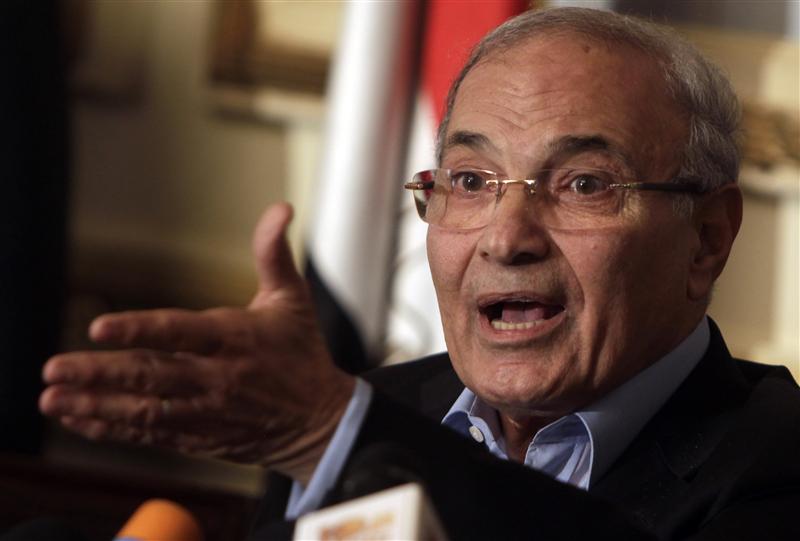Latest NEWS
- Aswat Masriya, the last word
- Roundup of Egypt's press headlines on March 15, 2017
- Roundup of Egypt's press headlines on March 14, 2017
- Former Egyptian President Hosni Mubarak to be released: lawyer
- Roundup of Egypt's press headlines on March 13, 2017
- Egypt's capital set to grow by half a million in 2017
- Egypt's wheat reserves to double with start of harvest -supply min
- Roundup of Egypt's press headlines on March 12, 2017
Mubarak's last premier polarises Egypt's voters

Hopeful presidential candidate Ahmed Shafiq - Amr Dalsh/REUTERS
The face of Hosni Mubarak's last prime minister beams down from huge billboards on major highways promising "Egypt for everyone", but Ahmed Shafiq is polarising voters ahead of next week's presidential poll.
For some, his government experience and background as a former air force commander promise an end to the turbulence since Mubarak was ousted more than 15 months ago and a military council took over.
But Shafiq is a lightning rod for criticism for those who see him as a holdover from the old era.
This week he fended off charges that he was involved in selling land allocated for armed forces personnel to Mubarak's sons. Last month, he narrowly evaded an attempt by the Islamist-dominated parliament to disqualify him from the race.
"We need a military man like Shafiq who knows Egypt well and will be able to work with the military leadership to sail this country to safety," said Ahmed Shehata, 35, a former member of Mubarak's defunct National Democratic Party (NDP) at a rally at Jabal Asfar, on the impoverished outskirts of Cairo.
His critics say Mubarak-era figures, or "feloul" (remnants)as they are derisively called in Arabic, have helped Shafiq snap up some of the most prominent billboards in the capital.
At least two parties, dominated by former NDP members, say they back Shafiq. A member of one, the Egypt Freedom Party, said it was using former NDP branch offices for the campaign.
That former party base plus the so-called "silent majority" of Egyptians who were glad to see the back of Mubarak but who now worry about stability of the state could yet help Shafiq squeeze into an expected run-off vote in June, though sketchy opinion polls suggest he remains a dark horse.
Parliament, now dominated by the Muslim Brotherhood and other Islamists repressed under Mubarak, had sought to eliminate Shafiq from the race with a law banning those who held top posts in Mubarak's administration. But an election committee let him run pending a review of the law by the constitutional court.
Many Shafiq supporters come not from the political hotbed of Cairo and other cities, but from the countryside, where voter concerns about security and order tend to be strongest.
His staunchest opponents are already threatening to galvanise the streets against him if he pulls off a surprise.
DIVISIONS
"Egypt's next president will be a revolutionary one. We did not ignite this revolution so that the 'feloul' would take it back," said Mohamed Fahmy, who backs a leftist candidate.
Even Shafiq's rallies hint at divisiveness.
At Jabal Asfar, he was mobbed by a devoted crowd next to the podium. But as the audience thinned further back, some grumbled about his lecturing style and his argument that Egyptians were prone to bad manners with tourists, deterring return visits.
"He didn't talk about all the resources we have in this country, he only talked about tourism. Is that all this country has?" said Hossan Goma al-Suweila, who attended the rally but said he would vote for an Islamist, not for Shafiq.
Shafiq, speaking in general terms, advocated investing in the Suez Canal area, described the failings of the education and health systems and promised to confront thuggery on the streets.
In the audience, Ismail Shawki shrugged off the lack of specifics and pointed to Shafiq's record, which includes modernising and expanding airports as aviation minister.
"No one has real solutions until they become president and begin to rule. Shafiq proved himself in the past. He doesn't need to offer solutions now. But when he is president he will," Shawki said.
Shafiq left the rally in a convoy of black sedans along with several police pick-ups full of armed state security men, the kind of convoy Mubarak and his officials would use, snarling up roads to the frustration of many ordinary Egyptians.
But as the rally dispersed, Abdoh Mokhtar, 36, who works for an electricity company near Jabal Asfar, said he was convinced Shafiq was the man of the moment.
"He was a military man and a prime minister and a minister. You cannot go wrong with Shafiq," he said. "This country needs a statesman, not a rookie in politics."
(Writing by Marwa Awad; Editing by Edmund Blair and Alistair Lyon)










